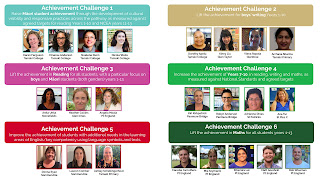With this foundation, we were able to begin the year ready to launch into collaboration, conversation, and critical thinking.
Our website was already populated with the collaborative inquiry groups based around our achievement challenges and people slid into the group conversations with ease.
Our first after-school PLG was held on Thursday, February 8th. We had two guest speakers to provoke and support our approach in 2018, both from Auckland University; Dr Jannie Van Hees and Dr Rebecca Jesson.
The outcome of a year of robust and rigorous inquiry in 2017 was a consensus from all teachers that regardless of year level (ie 1-13), curriculum area or achievement challenge, language acquisition and development was proving the biggest barrier to progress and acceleration for young people in Manaiakalani schools. This includes acquisition in the early years and subsequently impacts the ability to transfer and sustain language across school levels and curriculum domains.
It was agreed that "Language in Abundance" is the lens for all our inquiries and Dr Jannie Van Hees has been invited to support us. She opened the conversation with a presentation using the notion that
"Language in abundance environments ‘drip’ with language availability and attention, where noticing and relevant use of words allows for deeper, wider, more specific and precise, context-appropriate language expression…leading to knowing at deeper and broader levels."
Many of our teachers live-blogged their presentation, adding their reflections and responses. Here is a selection of these.
Our attention then switched to the unique opportunity the Woolf Fisher Research Centre is offering our CoL in 2018-2020. Dr Jesson will lead a team who will analyse data and evidence from teachers’ inquiries to identified Learn Create Share practices likely to contribute to accelerated progress for students.
 We have often spoken about the three lenses that Manaiakalani schools and teachers have available for exploring our learners' achievement and progress - and for providing evidence to whānau and the government about what is being achieved:
We have often spoken about the three lenses that Manaiakalani schools and teachers have available for exploring our learners' achievement and progress - and for providing evidence to whānau and the government about what is being achieved:- Each schools' own local assessment practices
- Outcomes from each teacher's inquiry into their current practice
- External evidence provided by WFRC when they evaluate our test data and conduct classroom observations and surveys
This presentation was also shared on teachers' blogs.
We are in for an exciting year as our teachers share their journey and inquiries, modelling 'Learn Create Share' themselves.


